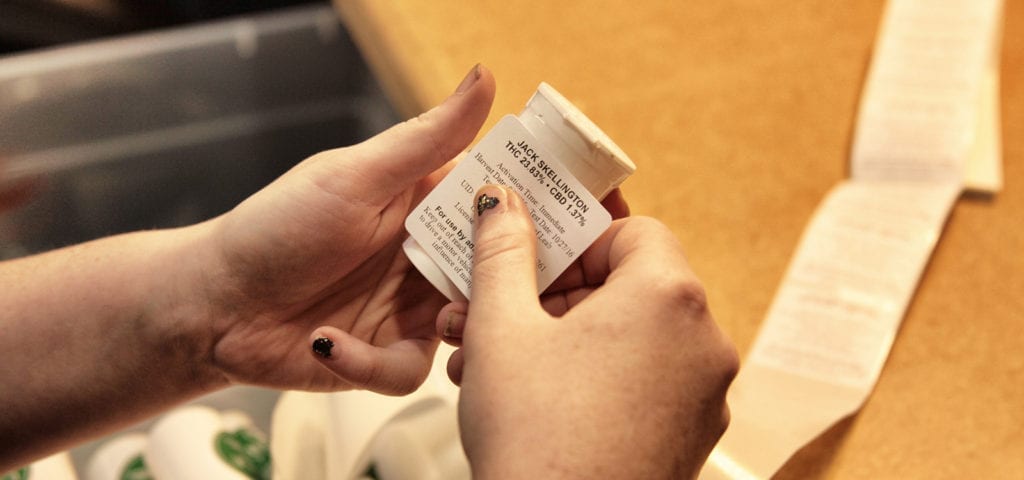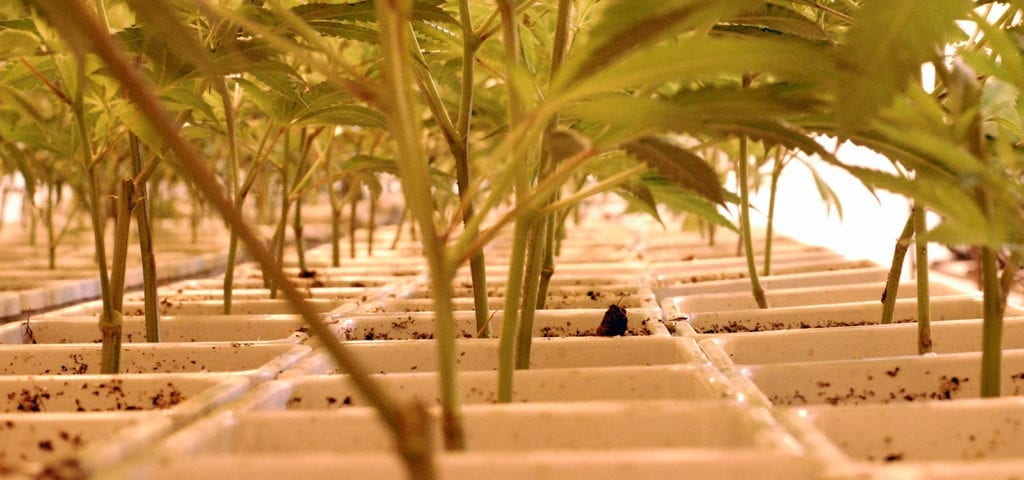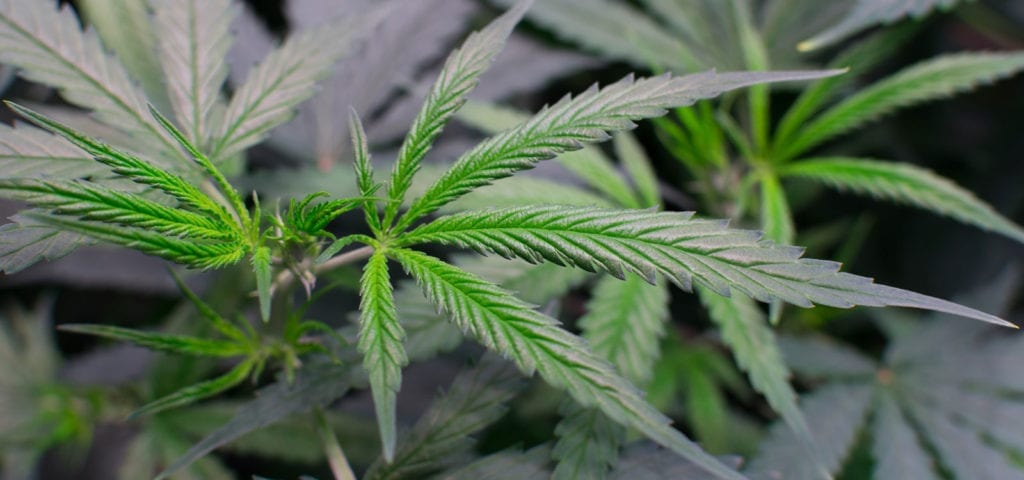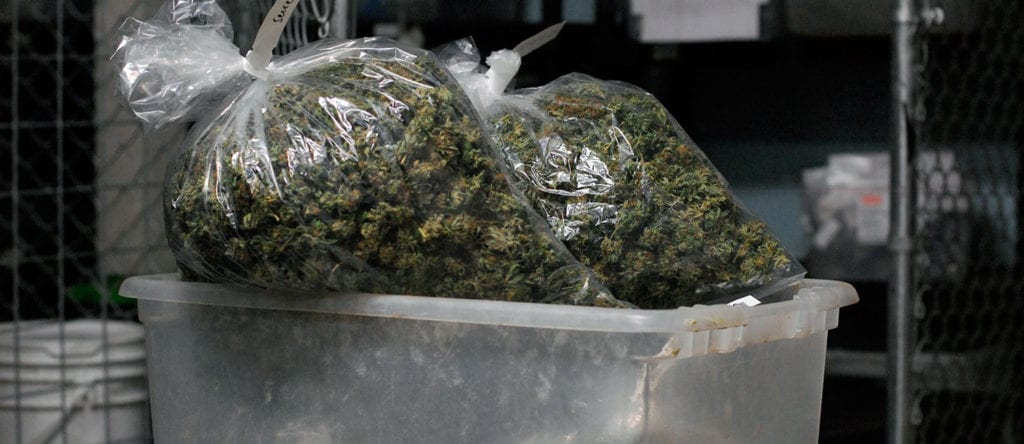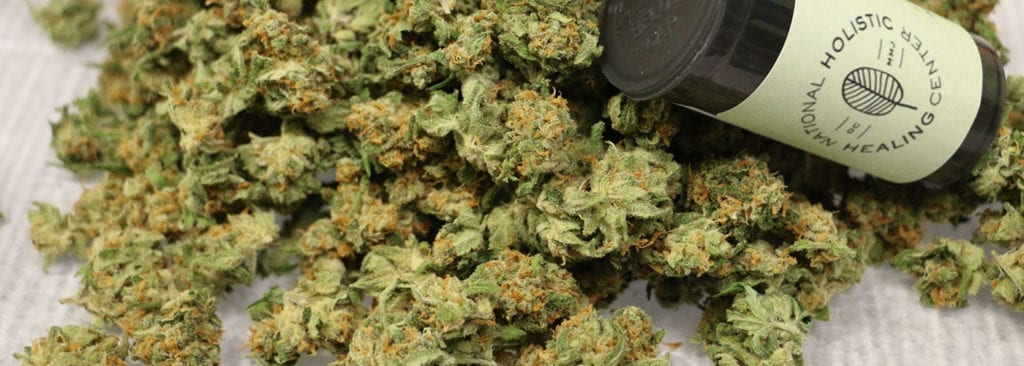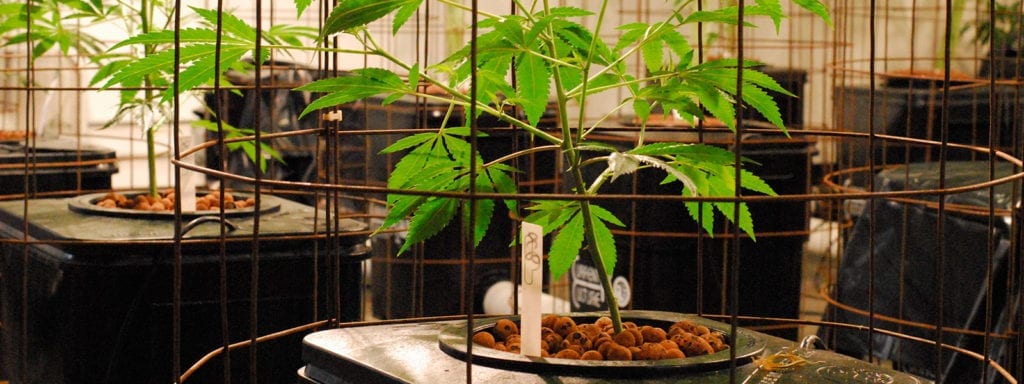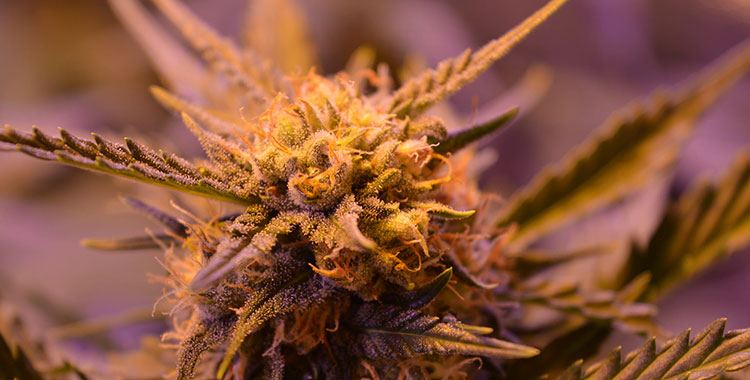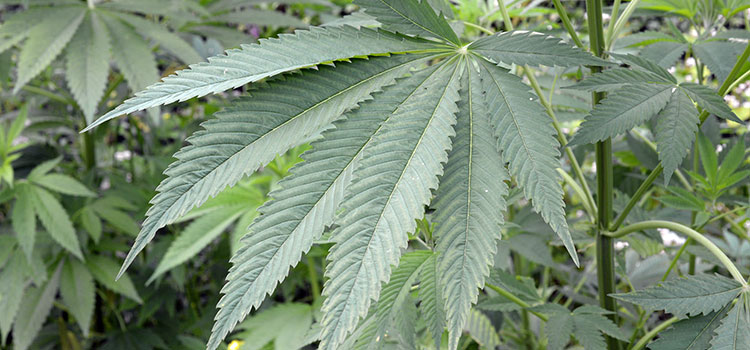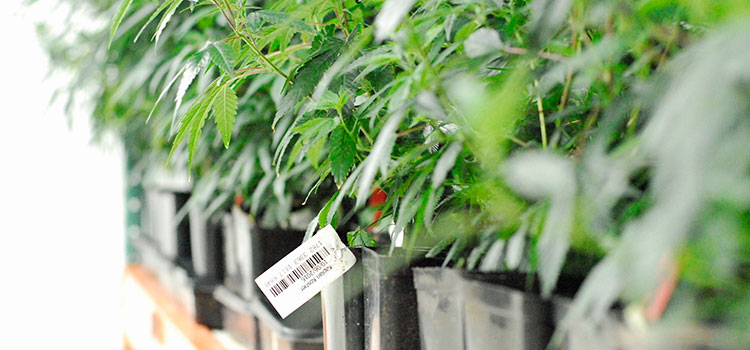We are excited to bring this special episode of Shaping Fire, hosted by Shango Los, to the Ganjapreneur audience. Shango recently interviewed Kristen Baldwin, the director of operations for Green Mountain Harvest, a Colorado-based cannabis trimming agency that sends its employees to grow sites around the state to help commercial and residential growers complete the final steps of their harvest cycle. In this interview, they discuss the many demands and expectations of running a professional trimming agency, including workplace safety concerns, ideal trimming strategies and tools, and the general business plan that Green Mountain Harvest follows to find success in the industry.
Listen to the interview below, or scroll down for the full transcript. For more episodes of Shaping Fire, visit www.ShapingFire.com.
Listen to the podcast:
Read the transcript:
Shango Los: Welcome to the Ganjapreneur.com podcast, I’m your host and founder of the Ganjapreneur podcast, Shango Los. You’ve not heard my voice here in a while. Back in April 2016 I took a break from Ganjapreneur to focus on consulting for new cannabis startups, and traveled the country to get a better understanding about what was happening in cannabis states. I’ve now launched a new podcast called Shaping Fire. You can find it at ShapingFire.com, or wherever you download podcasts. During episodes of Shaping Fire, I interview the cannabis industry’s top professionals, and cannabis business, health, and public policy. Very much like I did for the first 54 episodes of the Ganjapreneur podcasts.
If you’ve not heard those first 54 episodes, be sure to check them out at Ganjapreneur.com in the podcast section. Today though, Ganjapreneur has invited me to share with you this week’s episode of Shaping Fire. I hope you enjoy it, and I hope you subscribe to Shaping Fire to listen to more episodes in the future. Thanks to Ganjapreneur for inviting me back to spend this time with you.
Trimming is a constant companion of the cannabis community. Since the earliest days of commercial cannabis, growers have been trimming their cannabis flowers to increase their bag appeal, and clean up the flavor profile from being overly green tasting. Trimming styles change depend on where you live, and what your final use of the flowers will be. One thing for sure though, trimming is very time intensive, and it’s hard on your hands, and usually your back and butt too. It is true though that it is a necessary step in producing fine cannabis, and both home growers and commercial growers need to get the job done one way or another.
You are listening to the Shaping Fire podcasts, and I am your host, Shango Los. My guest today is Kristen Baldwin, director of operations of Green Mountain Harvest. They are a mobile trimming company that sends out teams of between one and 15 or so people to trim home grows and large scale commercial grows too. Today we’ll talk about the different styles of trimming, their favorite scissors to use, and get a better understanding of their business plan and how they make money in this area that many in cannabis consider a difficult necessity. Welcome to the show, Kristen.
Kristen Baldwin: Hey Shango, good to be here.
Shango Los: So glad you could make the time to join us. The cannabis market is exploding of course as licensees, and patients, and even just everyday citizens are beginning to grow. What are the kinds of clients that you find calling you for trimming services?
Kristen Baldwin: It’s interesting, we see clients all the way from large-scale commercial growers who have several locations in which we trim with teams of 15 to 20 trimmers several days a week to personal growers in their homes who have just a few plants. Really, it’s a huge range.
Shango Los: It probably feels like two different departments because of the demands of your big commercial growers, the expediency, and the regularity, and how after once the contract is set up, it’s plug and play versus your personal trimming services where you might just be at somebody’s house for a day or two, and so you have to create that relationship anew with that person, way differently than the commercial clients.
Kristen Baldwin: For sure, and to that effect, we make sure that the people we send to, our personal grow clients, our supervisors, they’re are our best trimmers, they’re our fastest, and also they’re in a position to educate in the home as the client wants us to or doesn’t want us to. They may want to sit with the trimmer, they may not. It’s really up to them how involved in the process they are, and how closely they work with the team.
Shango Los: Yeah, I can imagine that. I can imagine that there’s a lot more customer service. Actually, it’s probably really weird too to be in some people’s homes. That’s awfully intimate, and if they’re growing, maybe sometimes they’re a little sketchy about having people in their homes. Then heck, if they’re patients, some patients, they’re living in some rough situations sometimes. I can imagine that’s a very colorful environment for your team.
Kristen Baldwin: Yeah. What we find is that it’s really just great people who generally are either caregivers for their own needs, or caregivers for a friend, or family, or group of patients, and they’re genuine kind individuals who just really need a service sometimes. Especially with the older folks, it’s just that they’re not able to manage it themselves. With some folks it’s that they’re new. It just depends on the situation. Some folks are just not able to physically take care of the plants themselves, so there’s sometimes that we go do harvesting, and gardening, we can move clones around. It’s really a fit to your need kind of service, especially in that circumstance. Really, even all the way up to the commercial grower. It multiplies out in the same way. We use the same formula regardless of where we are.
Shango Los: I can actually imagine. I’m a patient and all, but my hands still work fine, and I can do my own trimming, but I hate trimming. Right?
Kristen Baldwin: Right.
Shango Los: If you were in my state, I think I would just call, because my time is better spent recording a podcast, or calling an advertiser instead of spending my time trimming. I would expect that you have a lot of people who certainly can, but it’s just not how they prefer to spend their time.
Kristen Baldwin: That’s exactly it. Also, that’s even true in the commercial space is that it’s not that they couldn’t hire and manage that staff, it’s that they prefer not to. It’s that they have enough on their hands just managing growing the plants. It’s a completely different skill set. That’s the other thing. Just because you know how to grow doesn’t mean you know how to manicure. Interestingly, we find some of the best trimmers come from industries like cosmetology school graduates for example make excellent marijuana trimmers as you can imagine. They’re the fastest that we’ve seen, and the most deft with the smaller work, which some of it can be quite meticulous.
Shango Los: Yeah, that makes a lot of sense. Do you charge by weight or time?
Kristen Baldwin: We charge per person per hour. Based on the size of the team that we send you, and the number of supervisors versus trimmers, that calculates an hourly rate. We don’t charge any administrative fees or anything weird on top of that. On a daily basis, that gets observed by the grower, whether that’s a personal grower or a huge commercial grow, they see the same tablet that says, “This is how long we were here, this is who was here, this is how much it costs you.” We try and keep it as transparent and without much room for error. I find that doing it by weight, it just lends to a lot of variance and ways that things can go askew.
Shango Los: Yeah. Well, then you have to change the price for dry or wet, and how dry is it. Yeah, yeah, I could see that be a lot of malarkey. Well, I’m sure that I’m not the only one listening to you who’s curious about a ballpark figure for what this would cost. I also figured that you probably have got a wide range of pricing from your bulk commercial clients, to somebody who is a personal grower. Let’s say that somebody’s just got your simple, legal six-person grow, and they’ve got very moderately sized plant. Let’s say everything’s a medium. What would I expect it to cost to have one or two of your people come and trim out my six plants?
Kristen Baldwin: I think that it would really be just a few hundred dollars. It would be a day of work for one or two people. If it’s six really productive plants, like a big, big fat Indica, versus a Sativa that’s going to have a lot fewer, smaller buds that are further apart, that would make a difference in how many hours it would take. Generally, we wouldn’t book more than a day. All of our personal grow clients, I’ve never really seen it go over more than two days unless the objective is for us to come and cut the plants down on one day, and do the harvesting and defanning, and then let it dry and come back and do the trimming on another day. Which is quite often how it goes. It could be two days, but it might only be four to six hours of work on each day.
Shango Los: I get that, I get that. For me to think, “Okay, my six plants go from being cut and hung, which I would do, to being nice and in jars done for a few hundred bucks. I’d be in.
Kristen Baldwin: Right, most people would.
Shango Los: Yeah, totally. There is a lot of variety in trimming styles, like if you’re trimming for bag appeal, it’s going to be a lot tighter. Where I live out here on Vashon Island, people leave their flowers really shaggy, because they’re like, “Look at all those tricombs on there. I’d rather have those on my flower than in the trim, which you’d normally go somewhere else.” What sort of client intake do you perform to make sure that your team is providing trimming that matches the client’s expectations?
Kristen Baldwin: Right. Every time we get a new client, there’s an intake they go through that talks about, do you trim your stuff wet? Do you trim dry? Is this just us prepping a large amount of cannabis to go into a trim machine? Which is one job that we do for really, really big clients. Are you going to make some sort of extract out of this? Are you extracting in some way? Are you making hash? What are you doing? That’s the end game can dictate the trim in some cases. Then all the way down to I want a loose, leafy trim, maybe for something like a caviar role where you want to take all your excess keef and reroll those buds in it so the leaves are something for it to stick to. We have some clients who are absolutely, because their medical clients are on such a tight budget, they want to make sure that there’s not even any little tiny crow’s feet, or anything left on the buds that’s extra stem, because that’s a lot of time what the client is looking for. The end user.
As the intermediary, our big deal is we will do it exactly how you want. Why we have the supervisors there who can interface directly with the client, and get really specific information on what the team is supposed to do. Then also, over time, because a lot of places we go back over and over, they’ll develop a rapport, and then it becomes almost fluid as a new member of the team comes on to really get them up to speed on that particular style for that place fairly quickly.
Shango Los: Right on, that makes a lot of sense. Let’s dive into one aspect of that a little more specific. Let’s say that you’ve got three clients, one’s going to make everything into bag hash, one person is going to process it in a BHO tower or something, and the third person is going to just roll it up and smoke it. How would you trim differently for those three clients?
Kristen Baldwin: Okay, so for someone who is doing a BHO extract, they may be wanting a very heavy trim product, and that may be all they’re using to make their BHO. They may be then separating out the bud, or they may be doing what’s called a nug run, which would be that extraction using the buds as well. That would be the point of clarification there. Is your main product goal for the hash going to be the trim or the trim plus the bud? Which thing do you want? Then if they really want everything together, the Phoenix tears, then it would just be shucking. Essentially, getting it off the stem and ready for processing. That would probably happen wet.You wouldn’t do much more to it after that.
For somebody who’s going to smoke the buds themselves, then typically, we would do something more of a de-fan first in the harvest, flip, and then trim it down dry, because you can get a much finer trim on a dry product. It’s a more time-consuming manicure, but ultimately, you’re getting a lot more flavor that’s solely from the bud, and you’ll lose that hay taste or smell a lot more quickly if you trim it that way.
Shango Los: I remember the first time I was involved with a grow for a large CO2 run. It was the first time I have been shucking. Up to that point I had always just trimmed for personal smoke, but then, I was being mentored and learning how to do this, and I saw these folks just shuck it right off the branch, and it drops into the bin, and I’m like, “No F-ing way.” You’re somewhere in between, “Is that disrespectful to the flower?” To, “Oh my god, this is going to be the easiest trim ever, right?
Kristen Baldwin: Exactly, right. You’re never really sure which thing is true when you’re doing that process.
Shango Los: Well, especially if you’re working for somebody else, right?
Kristen Baldwin: Yeah, absolutely. It’s a big responsibility to take somebody’s hard work over several weeks and then take it from that state to a usable end product. That’s really the intermediary that the trimmer performs in a lot of cases, especially if it’s not going through an extraction process. If the trimmer mangles the buds, they mangled the buds. That’s it. If they’re squashed, they’re squashed.
Shango Los: It’s not like you can suddenly replace them, it’s like, “Oh, sorry.”
Kristen Baldwin: No, there is no little bike tire pump that you can stick back into it and, “Oops.” Once you’ve squished it, it’s over. I think that that’s why it’s such an intense process. Also, these guys are working under extreme scrutiny, and that’s another thing to keep in mind on the commercial level is that we’ll have a team of 10 people, they’ll have three or four cameras on them at all times, everything has to be meticulously weighed and accounted for because of the systems here that are extremely rigorous in managing this whole market, both on the medical and retail side. It’s a lot of responsibility, and we don’t take that lightly. Nor does anyone really in the whole chain of process that’s involved with this on a commercial level. You have to take it really seriously.
Shango Los: Right on. We’re going to take our first short break and be right back. You are listening to Shaping Fire, and my guest today is Kristen Baldwin of Green Mountain Harvest.
If you like podcasts like Shaping Fire, chances are that you will like audiobooks too. Pretty much, audiobooks are like podcasts except with less stuttering, better production quality, and more targeted topics. Yeah, I know, I make audiobooks sound better than a podcast, and maybe they are. I get you, I like podcasts too. I like to learn from people talking to me while I’m doing something else, like driving, or cleaning my house, or making dinner, or even being at work, whatever. Here’s the thing, Audible.com has an offer I want to tell you about.
Right now, they are offering a trial of their audiobook service for absolutely free. You can go to ShapingFire.com/Audible, and you will get a free audiobook straight up. You can listen to it on your mobile device, on your computer, or you can download it and listen to it pretty much anywhere. It’s really simple. Of course, they really want you to subscribe to their service forever and enjoy more and more audiobooks. As cannabis users, you also know how this goes, the first one is free. They’re going to hate I’ve said that. It’s pretty great. I listened recently to Smoke Signals by Martin Lee from ProjectCBD.org. Martin’s book is a classic of cannabis advocacy. He explains the history of cannabis in America, THC and CBD cannabis science, and white cannabis policy in America has gotten so jacked.
If you consider yourself a cannabis person, this book really is a must. Talking cannabis we all sound radical just because we’re talking about weed, but if you learn the history and science of cannabis, suddenly you become smart and trustworthy to people. The book was really incredible, and there’s no doubt that Martin Lee is the real deal. You can get the book for free just for doing the trial. If you don’t want to listen to a cannabis book, that’s cool too. There’s everything else. There is sci-fi, and history, biography. Hell, you can even listen to a book about card counting in blackjack. Whatever, it’s all pretty rad. Here’s the deal, your first book is free, it’s easy to sign up, it’s easy to quit. They do do a pretty good job making me want to stay every month. Just check it out. Go to ShapingFire.com/Audible to find out more.
Welcome back, you are listening to Shaping Fire, I’m your host Shango Los. Our guest this week is Kristen Baldwin, director of operations at Green Mountain Harvest. In the first set we talked a lot about the idea of the trimming business, and the kinds of people who hire you, and actually, how damn necessary it is in the new legal market. It’s funny because a lot of people have trimmed before, and so a lot of people have got their preferred method, and their preferred scissors. I’m totally curious.
In online grower farms, it seems like everybody has their own favorite scissors. I, myself, like small spring-loaded scissors with a curved tip, so I can get on in there in the flower. My growing mentor, he prefers tiny scissors without a spring, but with really big hand openings. Do you find that your team, like everybody likes their own style, or is there a particular style that seems to really come out as being universally best by professionals?
Kristen Baldwin: Sure, yeah, so we, I think in the early days of Green Mountain Harvest, so that was like six years ago, they did experiment with several different styles of shearers. What we’ve settled on, and really, we provide all of the tools through a supervisor kit that they carry in the field, we use the Hydro Farm curved blade shearer, and we chose that one because for a few reasons, one it’s super affordable, we think it’s a really good price point. The curved blade, kind of like you said, is really what we think creates the tightest trim, and also, it’s the easiest on your wrist we find because you’re not curving your hand as often. The blade is curved, so you can have a straighter arm. Allow the curve of the blade and then the twist of the plant, rather than arcing your wrist at a funny angle.
Shango Los: That makes me think about OSHA standards, and just general worker health. You’re in this odd position, because your company has the state level, but obviously, cannabis is still illegal federally. What kind of best practices have you put together for creating an environment that is ergonomically healthy for your trimmers, even though they spend their entire day using their hands and probably sitting down, which is probably two of the worst things that you could be doing?
Kristen Baldwin: Yeah, for sure. Actually, we really, really made a point of keeping safety as a main priority for our team. To that effect, when they are hired, they are given a set of exercises for their wrists and their backs. We also have a system in place where our trimmers can sit or stand, and they can go back and forth. Unless there’s some really heavy space constraints that would disallow somebody from being able to get up and choose to sit or stand, we encourage people to really take both of those options. Surprisingly, though OSHA is a federal organization, they have been great working with me directly over my years in this industry, regardless of the context, and really come and educated us, and had open dialogue with the industry. Yeah, we’re in a funny place.
There is no doubt about that. Our main goal is to create an environment for our trimmers that’s healthy, so that also involves not just an ergonomic situation, but some other things as well. To that effect, we have some other things. Masks if there’s any kind of mold or mildew present. We use a food grade brown butcher paper on the tables so that each environment is sterile. Our trimmers all use a new set of gloves after each break, so they are able to have left the building and come back in clean.
Shango Los: Do you have a daily team that’s pretty much full-time, or is it pretty much all part-timers who are on call?
Kristen Baldwin: All of our people are part-time, they are employees with us, which allows them to be covered under our Workmen’s Comp, which is a huge key in this industry. We’re really trying to put as many of those standards of normal working conditions in place for people, even though, again, we’re in that funny gray area. Generally, the trimmers work between 25 and 35 hours a week. December is certainly slower. We joke that we think that the trimmers get less work because the growers plan not to have to harvest right around Christmas, because why would they want to? That’s fine, we can plan for that. I’m looking at our January schedule, and it’s totally insane.
I think everyone who didn’t harvest in December is harvesting in January. Then we also lovingly call October Hemptober here in Colorado, because all the big outdoor farms, that’s a big, big time for them. That can be really fun and exciting little trips for the trimmers out to these really cool, outdoor, big, really, really nice farms.
Shango Los: That’s one of the funny things about outdoor, isn’t it? The idea of harvest? Obviously, there is lots of indoor in the country, and there’s certainly way more harvesting taking place as far as around the calendar, but in volume, harvest, suddenly you’re needed everywhere. Do you have a seasonal spike where you need to over hire just for harvest season, and then you get back down to a more basic crew for the rest of the year?
Kristen Baldwin: We actually don’t follow that kind of hiring practice. Once you’re an employee with us, you’re an employee, and we do our best to provide you hours consistently. For us, it really is a balance of demanding excellence from our team so that the people that do stay with us are the best ones, and then making sure that those people have work. It’s a delicate balance. I do handle a lot of the hiring, and firing, and all the stuff in between, and I do find that I do want to be able to provide work for people immediately when I hire them, but I do have to caution them that this is a business where there are lulls. We give our employees the opportunity to create their own schedules in the sense that they have some big flexibility there, which to that effect, if they need to have another part-time job to supplement this, we understand that that’s part of the deal.
Shango Los: On that note, is it a hard to find skilled trimmers to fill all the ranks? Because so many people say they’ve got experience, and then maybe they’re too slow, or distracted, or sloppy, or drunk, or whatever.
Kristen Baldwin: Yeah, so all those things have happened, and that’s part of why we have this supervisor in the field for each group of 12 trimmers. That allows us to, regardless of what your resume says, really watch what you do in that first 30 day probation period, and then if we can’t get you up to speed in that first 30 days, then typically, that’ll be it for people who just can’t cut the mustard. Sometimes, the other side of the equation is true, people find out that they really can’t or don’t enjoy the repetitive nature of the job. We do have people who will do it for a couple weeks and then say, “Yeah, I don’t want to do this.”
For people that want to put their headphones on and listen to an awesome podcast like this one, and trim some plants, and be with some great people, it’s a great job. The other cool thing is that we can hire people with some disabilities, so that’s pretty neat, because it’s like you have a walker, hey, man, if you can get into the facility, and we’ll make sure you can, then you can sit down and trim. That’s good for people who are retired, we have a lot of folks that just trim with us one or two days a week, and have their own grows, and just love it, and have been with us for years and years.
We have other people who are fast, young people, directly from the industry in the last few years who just are amazing, and so, so, so, so fast. That’s the other side of the workforce, is people who’ve just been trained commercially in the last few years. We don’t hire anyone directly who doesn’t have some sort of trimming experience. If you don’t have any charming experience, then we have a trimmer training school sort of program you can choose to go through.
Shango Los: I’ve met some folks who are on the autistic spectrum, and it’s amazing how appropriate trimming is for a lot of the folks who have got the hyperfocus ability, and they can work for long periods of time. You allow them to wear their headphones, and let them know you need done, and boom, and you’re like, “Damn, it was done fast, and efficiently, and in good cheer.” It’s really great. It’s amazing the kinds of people who are able to work in our industry who have not necessarily had the opportunity before. Can folks get high on the job?
Can folks get high on the job?
Kristen Baldwin: No, no. Yeah. There’s really strict regulations in place around use, anywhere within 500 feet of a commercial facility, whether it’s a grow, or a store, and extraction facility, you can’t use the product, or even bring personal product into that facility. Technically, when you go into a dispensary, you’re not supposed to even have any cannabis already on you. Technically, if they see that, they have to ask you to leave. If one of our trimmers is observed using cannabis within 500 feet of a facility, we have to fire them that day. Because they can lose their badge essentially to work in the industry. For just that.
Shango Los: I can imagine that for a lot of trimmers that’s a dealbreaker right there, like, “Listen, if I’m going to be trimming 30 hours a week, I want to be high for it, so no good, no good for me.”
Kristen Baldwin: Right. Well, what you do at home is your business, what time of day you do that is also your business, what you do when you leave the facility is your business, but what you do while you have to be at the facility, that’s the key. On a 15 minute break where you’re not allowed to leave, you can go outside and stretch, but it’s 15 minutes, you can’t leave the facility, you can’t smoke weed. I feel like there’s ways that people could probably get around that if their dosage requires a morning use, they could maybe supplement with an edible, or something else. No one is suggesting that, especially for a medical patient, they don’t do what they need to do. You can’t be using the product on the job. That’s the main thing, and that’s true just across the board. I think that that’s one of the big differences between what people think we do in this industry, and what we do. Is that there really isn’t a lot of use in the actual manifestation of the industry itself. That’s a completely separate thing at this point.
Shango Los: I think the more commercial and commodity-based it becomes, it’s going to continue in that direction. I remember when everybody was working in medical, and it was much less regulated and loose, everybody would get high at the beginning of just about every business meeting, because that’s how cannabis culture was. I found that frustrating a lot of time, because even though I got to try some amazing flowers and oils from that people would bring to the meetings, at the same time, so many of the folks would not remember the key points of the meeting, or what they committed to do, and then I would have to send follow up emails to remind them what they agreed to. Even though I enjoy the social aspects of it, I do see, as cannabis businesses are getting more serious, there are less people who are doing it cooked.
Kristen Baldwin: Yeah, it’s like I guess the three martini lunch would be the closest equation. Even if you’re in the beer industry, you’re not testing beers at 9 AM every day. You can’t do it, it’s just like in any industry where there is this quality to it where there’s some sort of state of alteration that’s going to occur. I think that in this industry, the reality is you’re trying to mitigate that weird, gray area. That weird, federal state, gray area. I think this is one of the ways that they’ve done that. Then the other side of it is exactly what you’re talking about. Professionally, at 10 AM, would it be appropriate to pop a bottle of wine? Maybe on a special day, but probably not. Probably not if you want to get a lot done.
What people need to do to take care of themselves medically, again, is another thing, but I would say recreational use in a meeting is really bad, especially because you could have 10 different people who respond to that particular strain super differently. That could be one that’s really makes you really focused, but it may not work that way for this whole group of people that now you have to make decisions with.
Shango Los: Yeah, that makes sense. We’re going to take another short break and be right back. You are listening to Shaping Fire, and my guest today is Kristen Baldwin of Green Mountain Harvest. Businesses everywhere are constantly striving to reach out to people through advertising. We all know though that trying to reach a cannabis audience with a quality message is pretty difficult. That’s why many people choose to advertise on the Shaping Fire podcasts. Advertising on this show allows us time to talk about your product, service, or brand in a way that really lets people know what sets your company apart from others. Bold people who own companies know that getting into a relationship with their customers is essential. That is what we offer.
We will explain your service or product, and what sets it apart as desirable, and help our audience get in contact with you. It’s pretty simple really, advertising does not have to be whiz, bank, smoke, and mirrors. Nowadays, I find that people prefer just to be spoken to calmly, accurately, and with good intentions. If you want to make your own commercial spot, you can do that too. Because the podcast is young but growing at an exceptionally fast rate, if you become an advertiser on the Shaping Fire podcasts now, you are going to pay a fraction of the cost we’ll be asking for in just a few months. Yet, everyone listening both now and to the back catalog of interviews later will hear about your company again and again for years.
It’s a great deal for you. Pay a small amount now because the show is new, but take advantage of the huge listening audience we will have forever. Do yourself a solid, and contact us today for rates on podcast and newsletter advertising. Email hotspot@ShapingFire.com to find out more.
As a business owner, you are incredibly busy. In reality, you are responsible for everything your company does. You have so many responsibilities every single day, that often, you just don’t have the time to really dig into something as deeply as you’d like. You know there is more that you could do to reach out to new customers, and to encourage loyalty in the customers you already have. You certainly don’t have the time, and you’re not ready to hire someone full-time for that role either.
For you, I recommend Blunt Branding. Blunt Branding principles, Kiersten Nelson and Anthony Garcia are focused on improving your bottom line. Most marketing firms are excited to make your logo, packaging, and website very pretty. They leave responsibility for improving your bottom line up to you. They don’t want that kind of responsibility. That is pretty much the most important part of marketing, right? Kiersten and Anthony will help you engage new customers, funnel them to your point of sale, and keep them coming back to you and telling their friends. No doubt this is a paid commercial spot, but that does not mean they bought my opinion.
I worked with Blunt Branding on three projects now for various clients, and every single time they have done more than they have promised, and over delivered on results. I love how they generate new revenue, and focus on that as the goal instead of just making me a pretty logo. Similarly, every friend I’ve referred them to has come back to thank me, and that just does not happen every day. Grab a pen and paper, because the website address is coming. If you want someone to implement marketing programs that feed your bottom line, give Blunt Branding a call. They will share proven techniques to increase your audience, and generate sales while using cutting edge technology in the background that make all of this easy, automatic, and trackable. Go to ShapingFire.com/bluntbranding to find out more. You can also click the link in our weekly newsletter. Blunt Branding, marketing that makes you money.
Welcome back, you are listening to Shaping Fire. I’m your host, Shango Los, and our guest this week is Kristen Baldwin, director of operations at Green Mountain Harvest. Before the break, we were talking about a lot of the specifics on not only running a business, but working the best possible customer service with either the commercial growers, or with personal growers. During the break, I was thinking about it, and it made me wonder about employee theft, because in a big commercial environment, maybe you can do something on the slide that the cameras don’t see, and if you’re in a real informal situation in somebody’s home, I can imagine being able to abscond with some there. What’s your experience with employee theft? Is that much of an issue?
Kristen Baldwin: Yeah, so we really, really, really just impale with every ounce of our strength into our employees how dumb it would be to try. We don’t typically have a lot of problem with that. That being said, people try all kinds of crazy things-
Shango Los: Like what?
Kristen Baldwin: Well like, there was an incident in one of the very first dispensaries that I worked in where the employee, he was in on their trim team, and what he would do would be to put several gloves over his glove, and then he would successively put a bud in each glove and stick it in his pocket as he was trimming. I don’t think that he really understood that his Adidas running pants were very much showing the outline of these, what looked like golf balls in his pockets. I noticed this, and I couldn’t figure out what was going on, because he definitely didn’t have golf balls in his pocket when he came to work. That was one of those situations where I think it seemed like a good plan at the outset, but in execution, particularly with the number of cameras that he was visible on, it just did not go well for him.
Shango Los: Yeah, I can imagine that. What I find, there’s so much cannabis just around in the industry, it’s a really dumb play to steal from work. Everybody’s got it in the industry, so why would you then go and risk your job to steal it?
Kristen Baldwin: Right, but here’s the funny thing, even at the beginning there was a whole point of contention around, well, what do you do with the little buds that fall on the floor? Like oh, it’s floor weed. In the early days, that was just going out the door. That was floor weed. Even that, in the long term, had to be accounted for, and there had to be standards of operation put in place to say, “No, you have to actually take that back, and weigh it, and say, “This is how much we wasted.” Account for it, and then destroy it. You can’t just sweep it up, and stick it in a jar, and take it home.
Shango Los: Let’s flip that dynamic around. Instead of the trimmer stealing, let’s talk about arbitrage. What if you get somebody who’s got a personal grow, and in lieu of paying you for some or all of it, they want to give you their trim for you to then resell to a BHO person or something? A, is that legal, B, is that something that you ever come across?
Kristen Baldwin: Right. No, that’s not legal. The only intermediary we would be in that process would be if we’re brought into trim, and then they’re separating those things out, and they send it with a licensed courier from their operation or another to take that to an operator. We can’t have the product at any point. That’s the nature of the difference in our licensing. Doesn’t allow us to have it, to move it, to grow it, to sell it. Nothing like that. Because that requires a much different license than what we have. We’re an ancillary vendor.
Shango Los: You can’t play middleman on the deals.
Kristen Baldwin: We can’t. Yeah. All that stuff is our FID tag, so essentially, we don’t own or move any RFID tagged product. Yeah.
Shango Los: Let’s talk about licenses in a different way. Up to this point we’ve been talking about either having a license to do a cannabis business, or an individual person having their badge, which allows them to work in the industry. I have not come across actually, you’re the only one actually, you’re the first trim company that I’ve come across, which is why I was so curious to have you on the show. I’ve been all over the country talking to people at this point, and so I think that the days of trimming businesses have now arrived. You’re going to be having a lot more competition soon. Are you looking to other states to license your intellectual property? Not a franchise, because we all understand that franchising is illegal, but are you looking to expand the Green Mountain Harvest name into other states?
Kristen Baldwin: We are, absolutely. Yeah, we have business opportunities now available in any state where it’s medical, or retail, or somewhere in between. We are available to create business opportunities for people who want to do this there. When the owner, Susan Chicovsky, started this six years ago, she really saw a need for this as an industry, and no one else was doing it. She had to go to the state and say, “This is what I want to do.” They said, “Wow, that’s a really good idea, we hadn’t even thought about that.” Hadn’t even crossed anybody’s mind that this was a really valuable and necessary piece of the puzzle to make all this work.
We have lots of different services available to that end. We sometimes just go and we’ll train teams of trimmers for people that already have an existing operation, and want to have an on-site team. We’ve sent people to other states, and we’ll send, again, some of our supervisors. Susan, the owner, will go, and they stay for a few days, or a week or two, and they get everybody up to speed. That’s one option. The other option is to actually become a partner, a Green Mountain harvest partner, and carry that name into another state. In that case, then you get a huge amount of our intellectual property, and our standard practices, and how we operate in that gray area successfully. Which is part of the key for sure.
Shango Los: Let’s circle back to you mentioning Susan going to the state to try to get the blessing for this kind of a business model. Because that is a really important entrepreneurial point. A lot of people are like, “Oh, now that cannabis is legal, I’m just going to start a business, and I don’t have to be an activist.” I think that all entrepreneurs in cannabis have to remain activists. Not only to make sure that your local government doesn’t pass some kind of moratorium that’s going to suddenly tie your hands, but what Susan did, Susan had to come up not only with the business idea, but then she had to lobby for it with regulators so that there was a license allowance for it. That’s extra credit to Susan for stepping up and following that, and I think that’s a good lesson for everybody that you might have a groundbreaking idea, and you’re going to have to sell it to your regulators.
Kristen Baldwin: Absolutely. Yeah. It’s all about being part of the movement overall. You may have a great idea, and you may be really scared about coming out of a gray market, or a black market with that idea, but unless you stand up, and unless you become part of the movement, and say, “This is what I’m doing, and this is why it’s important.” Then you don’t move us all forward as a whole. That’s really what she did was say, “Not only do I want to provide a safe way to handle the product for this particular point in its process, but also, what does a business model look like that really supports its employees as if this were any other industry?”
You have to have Workmen’s Comp. You have to make people employees, and not have them work as contract labor, which is so often what people are more apt to do, because it’s easier for the employer, but it provides the employee no protection. They’re not an employee. They have no protection. Susan really did say, “I want to do this, but I want to do this right, and what does this look like?” Got amazing certifications put in place for our company that say we are the most compliant, and this is how that looks. That’s why I was excited to come and work with her after years of doing other things in the industry for sure.
Shango Los: I think that it really helps the industry as a whole when people like Susan provide that leadership, because then the regulators can point and say, “Look, here’s a good actor who is doing it the right way, who is doing the things that cause us to feel more safe as regulators.” Then hopefully, eventually some of those regulations can be a little loosened so that they don’t cost as much for companies to comply. For now, we’ve got this strange dance between entrepreneurs and regulators of, what can the entrepreneurs get away with, versus the regulators wanting to regulate and/or ban everything, because they’re afraid of risk.
Kristen Baldwin: Absolutely. Absolutely, and that’s why people have to be really vocal, and they have to get out there. Even to the point of for children who are using cannabis patches in schools, that was a big, big hurdle that we had to overcome here in Colorado. Helping people understand that this is a medicine, and that these kids are using it. They’re not getting high at school. A kid in a wheelchair who can move their arms solely because they’ve started using these patches isn’t getting high. They’re having a better quality of life. Even something as simple as that takes a huge group of people, and a lot of effort, and a lot of people coming forward.
What I would say to anyone in those states where it’s still gray is don’t stay in the dark. Just get out there and be vocal, and get ready to be part of something special, because the amazing other side of this is that after you’ve been in this state where it’s gone recreational, and you’ve supported the medical market, and you’ve seen what’s happened here in Colorado, some of the outcomes with people getting out of jail, and all the cool stuff that happens on the side with the medical research, and the kids getting better, and the seizures going away, it’s worth coming out of the dark. Susan is going to Pennsylvania for example to speak at a conference that’s all just for doctors. Just getting the doctors on board is crucial. There’s work to be done in every state, and what I say is just be brave and go do it.
Shango Los: Thanks for being on the show today, Kristen.
Kristen Baldwin: Thank you, it’s my pleasure. How exciting. Thank you for doing such good work in getting this information out there.
Shango Los: Kristen Baldwin is director of operations of Green Mountain Harvest. You can find out more at GreenMountainHarvest.com. You can find more episodes of the Shaping Fire Podcast, and subscribe to the show at ShapingFire.com, and on Apple iTunes, Stitcher, YouTube, and Google Play. On the Shaping Fire website, you can also subscribe to the weekly newsletter for insights into the latest cannabis news and product reviews. On the Shaping Fire website, you will also find transcripts of today’s podcast as well. For information on me and where I’ll be speaking, you can check out ShangoLos.com.
Thanks a bunch to Ganjapreneur for having me back for a visit. Be sure to check out Ganjapreneur every day for the latest cannabis news. I’ve been your host, Shango Los.
